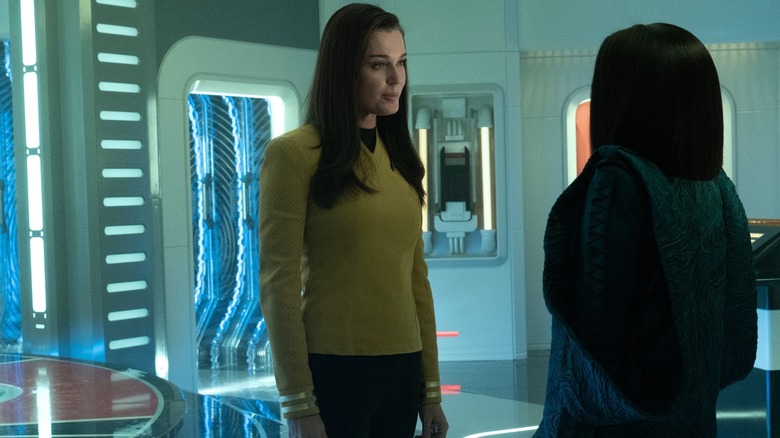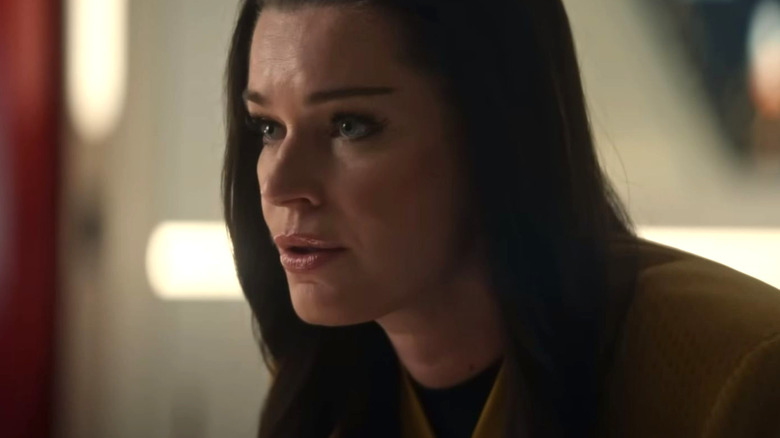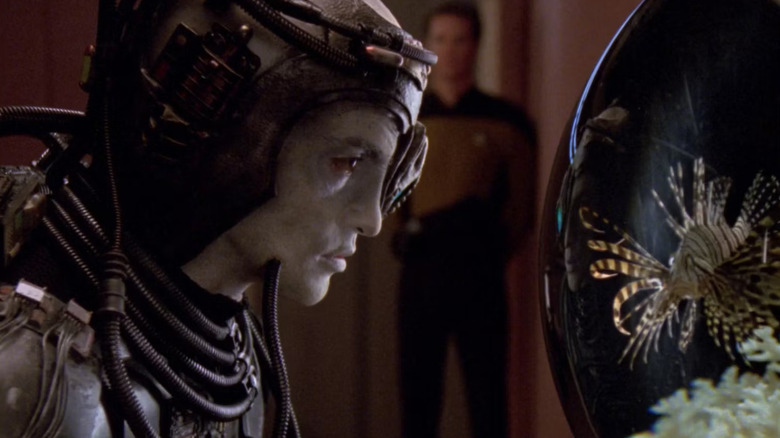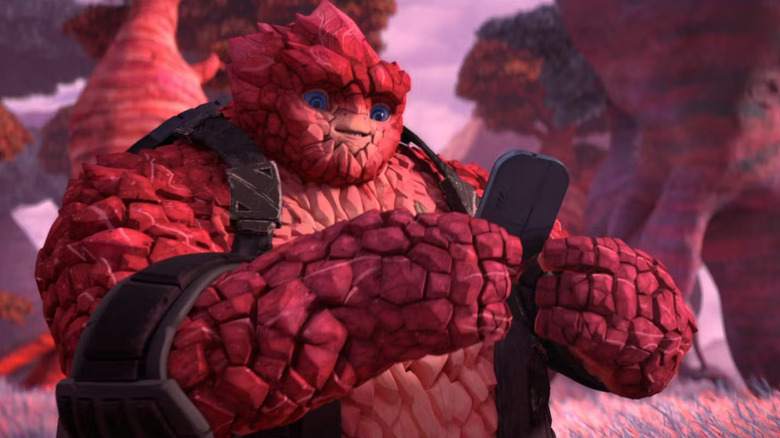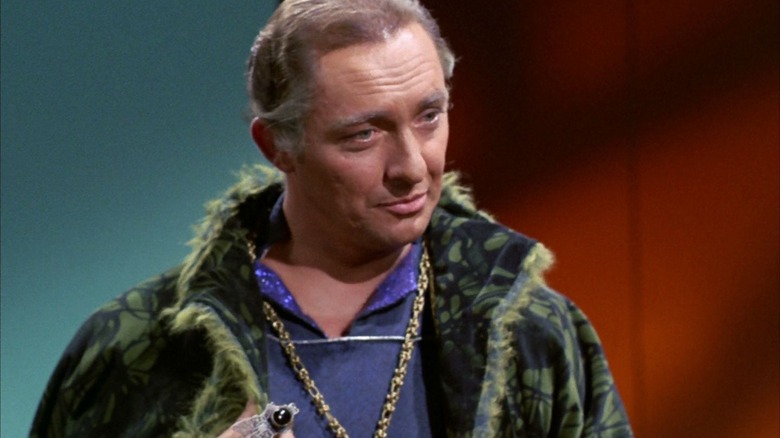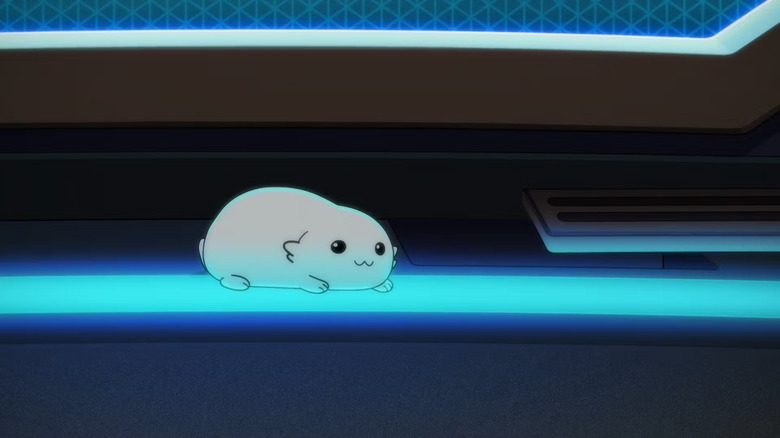The 5 Worst Character Names On Star Trek
It should be stated right up front that the below list is not meant to be taken as a commentary on the strength of certain characters, the talents of the actors playing them, or the quality of the show from which they hail. Indeed, most of them come from legitimately great TV shows and/or are played by very talented people. Some of them may even be among the greatest characters in "Star Trek," and I do not mean to suggest, even for a moment, that they should be removed from the franchise or altered in any way.
Except for their names. "Star Trek" is full of futuristic aliens and evolved humans that need to be named by modern-day screenwriters, and, well, sometimes those screenwriters come up with some pretty silly ideas. It's natural now to accept Brent Spiner's android character from "Star Trek: The Next Generation," but it feels very childish to name that character "Data." Human beings, after all, don't have names like "Synapses" or "Information." Why not give an android a human name? There is a deep-seated illogic to Data's name that has long since been ignored by Trekkies thanks to common usage. Now we just accept it.
Ditto for the Borg, which is, as far as I can tell, an abbreviation of "cyborg." That's not terribly creative, and one might wonder why a species of cyborgs would give themselves such a specific nickname. We also ignore that the last name of the Japanese character Hikaru Sulu (George Takei) isn't a Japanese word; there's no "L" sound in Japanese. But I adore Data and Sulu, and think the Borg were once one of the coolest, scariest things to come from "Star Trek."
Today, it is only the names we shall nitpick. And, golly, there are some strange ones. Let's take a look at some of the silliest, worst, and most confusing alien/future names in all of "Star Trek."
5. Una Chin-Riley (Rebecca Romijn) from Star Trek: Strange New Worlds
In the original "Star Trek" pilot, "The Cage," the U.S.S. Enterprise was commanded by Captain Christopher Pike (Jeffrey Hunter) and his first officer was an unnamed character he merely called "Number One." Number One was portrayed by Majel Barrett and played a notably large role in the episode. When the show was retooled to feature Captain Kirk (William Shatner), Number One vanished and Spock (Leonard Nimoy) took over the first officer role.
It wouldn't be until the publication of "The Autobiography of Mr. Spock" in 2021 that the character would finally be given a name. Her name was carried over to her reappearances in "Star Trek: Discovery" and then, later, "Star Trek: Strange New Worlds" (where she was played by Rebecca Romijn). Her name was revealed to be Una Chin-Riley, and perhaps a few Trekkies let out a groan.
Una, you see, is Spanish for "one." Her first name means one. Know that first officers are called "number one" because they are the first officer, not because it's a nickname. By naming the character "Una," the makers of "Star Trek" seem to have forgotten why Number One was called Number One — for even what a first officer was — and seemingly backward-engineered a reason for the appellation.
Something similar happened in the 2009 "Star Trek" film when Dr. McCoy (Karl Urban) make a crack about losing everything but his bones, leading Kirk (Chris Pine) to nickname him "Bones." The problem with that is that "Bones" was already a nickname for a doctor. During the Civil War, doctors, because they sawed off soldiers' legs, were called "Sawbones." In 1966, that's why Kirk referred to Bones as "Bones." A mistaken origin story for something that was already explained.
And don't get me started on "10 Forward" and how it was manhandled on "Star Trek: Picard."
4. Hugh (Jonathan del Arco) on Star Trek: The Next Generation
In the "Star Trek: The Net Generation" episode "I, Borg" (May 10, 1992), the Enterprise-D rescued an injured Borg from a crash. With an abundance of caution, the crew took the Borg onto the Enterprise, treated its wounds, and locked it in the brig. The Borg have a shared machine consciousness, so the single Borg became confused, unable to hear the hundreds of other Borg voices in its head. Eventually, the Borg begins to develop a consciousness, impressed by the calm and gentle treatment he received from the Enterprise crew.
When his personality began to emerge, Geordi (LeVar Burton) and Dr. Crusher (Gates McFadden) decided he needed a name. Dr. Crusher pointed at him, brainstorming. "You are ... You ..." she pondered. Geordi, inspired by the word "you," I guess, decided he should be named "Hugh."
The name didn't have to have any particular meaning, of course — they could have named Hugh anything — but not only is it an unpoetic name (apologies to all the Hughs of the world), it was also unbearably clumsy the way Geordi came up with it. True, Geordi is an engineer and not a poet, but surely he could have come up with something better than a word that rhymed with "you." I suppose we should be grateful that Data's creator didn't name Hugh, though. He might have been called "Eyepiece" or something.
Of course, I'd be the smart aleck to name him Björn, so maybe don't listen to me.
3. Rok-Tahk (Rylee Alazraqui) from Star Trek: Prodigy
Again, I want to clarify that I have no issued with Rok-Takh as a character, nor do I have any criticisms of Rylee Alazraqui's performance. Indeed, the appearance of Rok-Takh in "Star Trek: Prodigy" was notable for being the first time in "Star Trek" history that a character or an alien species invented for one of the franchise's many tie-in novels migrated into official on-screen canon. Rok-Takh belongs to the Brikar species, which first appeared in Peter David's book "Worf's First Adventure" in 1993.
But, golly, I hate that she's named Rok-Takh, as it sounds like the phrase "rock talk," which is a ridiculous name, given that her skin looks like rocks. She's a talking rock, so her name is Rock Talk. And her species is Brikar, which sounds like "brick-ar," and she's brick-red. It all feels very "Sesame Street."
Throughout "Star Trek," there are occasionally alien species who use proper nouns that just happen to sound exactly like certain English words. The Ferengi, for instance, can boast character names like Quark, Brunt, and Nog. The Ferengi get away with it, though, because Quark (Armin Shimerman) isn't a subatomic particle, Brunt (Jeffrey Combs) isn't dull, and Nog (Aron Eisenberg) isn't a holiday drink. Rok-Takh, in contrast, is a talking rock. It's too silly a coincidence to ignore.
That said, I hope Rok-Takh becomes an effective, happy Starfleet officer, and she is driven, gentle, and intelligent. I have no issues with the character, apart from the name.
2. Garth of Izar (Steve Ihnat) from Star Trek
The "Star Trek" episode "Whom Gods Destroy" (January 3, 1969) implies that all mental illnesses have been essentially cured thanks to modern medicine and super-advanced psychology. Indeed, there is only one institute for the criminally insane left in the entire federation, and it houses only a small handful of inmates. In later "Star Trek" spinoffs, multiple characters would be depicted with disabilities or mental illnesses, but instead of "curing" said characters with a magical injection or something, their disabilities were merely accommodated. The dramatic conceit of "curing" disabilities or mental illness with magical technology begins to tilt dangerously close to eugenics.
But in the original "Star Trek," it was implied that there are no longer any made criminals, except for the few who live in the hospital on Elba II. Recently, however, the lunatics had taken over the asylum. They were led by Garth (Steve Ihnat), a disgraced former captain who, bafflingly, had taught himself how to shapeshift. With his instability and his superpowers, Garth declares himself to be a Master of the Universe and he attempts to hijack the Enterprise from Kirk. The episode is pretty over-the-top, even for "Star Trek" standards.
And, come on ... "Garth?" You expect me to quiver with fear in front of a supervillain named "Garth?" I understand that Penelope Spheeris' teen comedy "Wayne's World" wouldn't be released for another 23 years, but I can only think of the nerdy, neurotic Garth played by Dana Carvey in that film. Garth is a "nerd" name, like "Cyril" or "Percy." It's hard to take the episode seriously when the villain has such a unique and unthreatening moniker.
1. Moopsy (Roan K. Lai) from Star Trek: Lower Decks
I hate to be a killjoy, but I hate Moopsy (Roan K. Lai) from the "Star Trek: Lower Decks" episode "I Have No Bones Yet I Must Flee" (September 7, 2023). In the episode, several crew members of the U.S.S. Cerritos visit a high-tech, deep-space zoo, overseen by the living root vegetable Narj (Carl Clemons-Hopkins). They are warned that the animals on the station are all dangerous, but kept safely behind forcefields. Narj panics when he sees that Moopsy, a small, marshmallow-like critter, has escaped. It seems that Moopsy's species can inject its victims with a chemical that liquefies their bones, allowing the little puffball to drink them.
The "a small cute critter that is unexpectedly violent" is an old trope that "Star Trek" should have stayed away from, and "Lower Decks," I'm sad to report, didn't do anything with the trope to make Moopsy stand out. Moopsy is more or less a Pokémon, able to say its own name, possessed of deathly superpowers, and more intelligent than it looks.
"Star Trek" already fulfilled its "dangerous little furry thing" quotient with Tribbles back in the 1960s, so it didn't need something like Moopsy to make the gag more obvious.
Also, I understand the writers of "Lower Decks" were deliberately trying to give Moopsy a silly, innocuous name, but they were too successful in this case. "Star Trek" has always been good about giving animals more scientific-sounding names, or at least a planetary origin. "Star Trek" logic should have dictated Moopsy be called, say, a Jorusian Bone-Drinker.
